|
Have you ever been called frail before? I was once by a priest in a homily; the word was unsettling. As the priest slowly enunciated the words, “You. Are. Frail” a flood of various thoughts rushed over me. Mainly, I was proudly scoffing and thinking, “I’ve got this. I have my spiritual life together. I mean, I am one of the few Catholics that goes to Mass every Sunday…That says something, right?”
Frailty. The word itself seems weak, puny. In reality, those thoughts of mine, the “Oh I got this” or the “I’m not doing so bad”—don’t they reveal my frailty, my weakness? They reflect a mindset rooted in pride that doesn’t think that I need Him. Perhaps more unsettling are Paul’s words to the Corinthians. Paul writes about begging God to remove a thorn in his flesh, to which God replies, “My power is made perfect in weakness.” Paul continues in his Letter, “I will all the more gladly boast of my weakness, that the power of Christ may rest upon me. For the sake of Christ, then, I am content with weaknesses, insults, hardships, persecutions and calamities; for when I am weak, then I am strong!” Doesn’t the world tell us that we need to have our act together—the complete opposite of Paul’s words above? Why would we boast in the things we are not good at? The saints are saints because they know they are weak sinners, and yet they never became complacent. They boasted in their weakness while asking God for the grace and love to grow in the midst of it and didn’t attempt things on their own. They were receptive to the Lord’s guidance, His divinity. Our Holy Father, Pope Francis, also exhibited this “boasting” at the beginning of his papacy when he said, “I am a sinner…but I trust in the infinite mercy and patience of our Lord Jesus Christ.” In Scripture, we are compared very often to sheep. Sheep need the shepherd to survive. They have been known to graze on the same grassy area, gnaw the grass to its root, which kills the grass, and eventually starve themselves to death due to the lack of nutrition. The shepherd must therefore guide the sheep for survival. Jesus, the Good Shepherd, guides us. Will we let him or will be remain complacent? The real problem that I encountered in the pew that Sunday was this complacency. Like the sheep, I was gnawing at the same grassy area, stubbornly thinking I was getting the nutrients and food I needed. I, like Pope Francis, must recognize that I am a sinner—that I am frail and I need Him. Only this will allow me to boast in my weakness. When I acknowledge that I am weak, I am acknowledging my need for Him evermore. When I acknowledge my dependence on Him, He then can give me the strength I need to make it through the day—to accept His Love in my human limitations. If we are to journey on the beautifully romantic and stretching road to holiness, we must be careful of feeling too comfortable while gnawing the same patch of grass. Instead, we are called to boast in our weakness and invite the Lord to move in us, to change us. Change and growth are uncomfortable, but necessary to the Christian life. For we are frail, and yet we boast in the sheepishness—knowing our Shepherd is strengthening and guiding us along the path. The quickest and surest way to be led by the Good Shepherd is by letting Him consume us in the Holy Eucharist. There, we are united with our Shepherd, held in His gentle and loving arms close to His Sacred Heart through the good and the bad. There, we will find true comfort, there we will be able to join St. Paul and see our frailty turned into true strength! Elizabeth Pawelek is pursuing her Master's in Leadership for the New Evangelization at the Augustine Institute in Denver, Colorado.
0 Comments
‘We are unworthy servants; we have only done what was our duty.’” -Luke 17:10
The passage above, taken from Tuesday’s Gospel, describes the humble response Christ tells us to have in fulfilling our responsibilities. Even when God calls us to do extraordinary things, we should seek no praise for them. This kind of humility is exemplified by Pope Francis, whose papacy has had a deep humility as one of its defining characteristics. When reflecting on the moment of his election as the Successor to Saint Peter, Pope Francis said, “This is me, a sinner on whom the Lord has turned his gaze … but I trust in the infinite mercy and patience of our Lord Jesus Christ, and I accept in a spirit of penance.” Most of us will never be given such a place of honor, but it is in the small every day experiences that we can show our humility and be an instrument of Gods graces. One example of someone showing humility comes from my brother, a midshipmen (student) at the U.S. Naval Academy. I feel that any person who offers up even a portion of their life to serve in the military and help make our freedoms possible should be respected and thanked. One way in which airline companies show their appreciation for the services provided by the military is to allow uniformed members of the military to board planes early. Though getting on an airplane a few minutes early may seem like something trivial, many of us go out of our way to try to get a good place while boarding a plane so that we may get a better seat or more overhead storage space. The U.S. Naval Academy requires all of its midshipmen to travel in uniform. Once while traveling home with my brother, the crew announced that any uniformed members of the military could board early. I looked at my brother, expecting him to board, but he didn’t. The women making the announcements had noticed him in the terminal and made the announcement again, but he still just sat there. As the women moved on, I asked my brother why he didn’t board when he had the opportunity to. He said something to the effect of not having earned any special treatment. Regardless of his service record, I don’t think my brother would take up the airline’s offer. My brother could have gotten a great seat, but he quietly turned down the offer. Service in the military for my brother is a duty. I think it’s an extraordinary responsibility worthy of many thanks. That is what makes the humility shown by so many of the members of the military such a powerful witness to me. If men and women who are willing to risk their lives can demonstrate such humility, how much more could I demonstrate in my own daily tasks? Let us pray for members of the military and thank them in whatever way we can for their service, and take to heart the example that those like my brother and others in our lives give us in doing the ordinary things God has called them to do with humility. Patrick Burke is a staff member at The Catholic University of America in Washington, D.C. On November 2nd of each year, Catholics observe The Commemoration of All the Faithful Departed, also known as All Souls Day. We are encouraged to pray for the dead and to remember our loved ones who have gone before us. Our prayers for these souls assist in expediting the “process of purification.” The Church recognizes that few people achieve perfection in this life (after all, we are human!), and therefore, go to the grave with remaining traces of sinfulness; a period of purification is necessary to prepare the soul to join God. The Catechism of the Catholic Church explains, “All who die in God’s grace and friendship, but still imperfectly purified, are indeed assured of their eternal salvation; but after death they undergo purification, so as to achieve the holiness necessary to enter the joy of heaven.” This is called Purgatory. It is important to recognize that Purgatory is not a state of punishment, but rather a cleansing very much like our Baptism. Think of it this way: Purgatory makes the soul perfect forever! Our prayers for the deceased put their souls in the HOV lane to complete purification and unity with God—pretty awesome! In remembering our deceased loved ones on All Souls Day, it is common for people to visit cemeteries and decorate grave-sites. For this reason, this feast day reminds me of my grandfather, Sal, or as I call him, Pa-pa. Pa-pa was not exactly a church-going Catholic until the last year or so of his life, but he religiously honored and prayed for the dead by visiting the cemetery of our relatives and planting flowers, placing wreaths or palm. Today, my mom, her two sisters and their husbands continue Pa-pa’s tradition of visiting the cemetery and decorating the grave-sites of all their loved ones several times throughout the year. I make an effort to join them at least once a year to pay tribute to my relatives and to follow my grandfather’s example of acknowledging those who have gone before us. I will never know why Pa-pa did not attend Mass with my grandmother for much of his adulthood, but something drew him into church towards the end of his life. Perhaps he knew his time was approaching and he found solace with the Lord. This year, I will be praying for all of my deceased loved ones, but I will be thinking especially of my Pa-pa with great hope. Be sure to reflect on the memories of your loved ones. If you can, make some time to visit a cemetery, light a candle and attend Mass this All Souls Day. *This post was originally published here and was used with permission.
Like many of you, I have been following Pope Francis’ visit rather closely. Undoubtedly, his presence has impacted each of us in different ways, and I am very excited about the words and actions to come in the days ahead. As I sit here in my office with an unusual lull in activity, I am struck by two ideas our Holy Father has articulated, but are getting very little play in the news. The first idea comes from his address to the U.S. Congress. While highlighting Abraham Lincoln, he emphasized unity, and Lincoln’s great struggle to bring union, freedom, and peace to a divided and war ravaged nation. Francis named the delicate balance of rejecting fundamentalism that threatens these great virtues that Lincoln fought for, while not sacrificing those same liberties in an effort to defeat these threats. Within that balance, our Pope names the danger of seeing the world in non-negotiable black and white. I am particularly caught by this because I am often far too quick to judge, especially in a political or theological situation. If people don’t think like me, I reject their ideas as closed-minded nonsense. This line of thinking is all too common in our society. 24-hour news channels that cater to particular political views, blogs and podcasts that target niche groups, and seemingly endless gridlock in Washington reiterates to us constantly that dialogue is overrated, and if you don’t agree with me I have no time for you. Unfortunately, there is a great danger in seeing things in black and white. When we see things in black and white we claim the moral compass; we claim to know what is righteous and what is sin. And when we get trapped in that line of thinking, there is no more room for anyone else in our lives, not even God. We declare our independence from what we view as wrong only to discover that we can no longer discuss and dialogue with those around us. Nothing anyone has to say is worth listening to. Here is where the Pope’s message strikes deepest. President Lincoln in his first and primary purpose fought the Civil War to preserve the union, to keep these United States from dividing into isolation. Lincoln chose openness and dialogue, and that is where Pope Francis is calling all of us today. For too long I have looked down on those I disagree with thinking they are not as nuanced or educated as I am. Yet God speaks in history, and if I fail to speak with and be open to my sisters and brothers, how can I hear God? How can I grow? And most importantly, how can I live in union as a member of the Church and as a citizen of this country, if I fail to dialogue and work in communion to realize the Kingdom of God and build a more perfect union? The second chord that struck me came from the address to the U.S. Bishops at St. Matthew’s Cathedral. While watching the reflection, I was unsure what the Pope was going to say, but I was deeply moved by the compassionate urgency he had while addressing the mission of the church in the United States. He acknowledged the heavy workload, the damaging reality of the sexual abuse crisis, and the corrosiveness of secular culture. However, he made very clear that it was in this context that all of us who minister to God’s people are charged with finding some way to evangelize, to bring people into a relationship with Jesus Christ as his disciples. In my new job I am struggling to engage young adults in their 20’s and 30’s. I have a loose plan, and we are having our first event in a few weeks. However, like anything new, I am having doubts about how successful it will be in bringing young adults back to Christ. I went through all of this training and education and I don’t have a sure answer for how to lead people to discipleship. What if no one shows up? Through that cloud of doubt, there was the Pope speaking to a cathedral full of bishops, but yet also speaking to my fears. Evangelization is the most important work. We must keep trying. We must keep praying, and we must keep going. Only God builds the Church, but we must keep removing barriers and facilitating encounter, so that the seeds of faith may be watered and eventually produce much fruit. These last few days have already made for an incredible papal visit. The headlines will undoubtedly continue to be filled with the Pope’s stance on particular issues, and on his discussions at the World Meeting of Families. Through all of that, try to listen to the words surrounding the hot buttoned issues because there Francis is not telling us what to believe, he is rather telling us how to live as human beings. Pope Francis, in his straight talk and unassuming persona, has figured out how to remove those barriers to faith, and in his words over the last few days, I can’t help but feel that Christ has spoken directly to me. Editor's Note: This post was originally published on Catholic How and was reprinted with permission
“How beautiful are the footsteps of those who bring Good News” (Romans 10:15-17)! With these words of Isaiah quoted by Saint Paul, Pope Emeritus Benedict XVI warmly greeted the cardinals, bishops, and educators assembled at The Catholic University of America during his April 2008 apostolic visit to the United States. Seven years later, Pope Francis will be following in the footsteps of his predecessors as he brings the Good News to our nation. He is the fourth pontiff to do so. While the good news of Christianity itself hasn’t changed in two thousand years, its Argentine messenger is certainly electrifying the faithful with his personality of joyous humility, simplicity, and compassion evident in the course of his evangelization--specifically renewed calls to holiness and having an unreserved love of neighbor. And yet, it is all too easy to become lost in the so-called “Francis effect” (and attempts to get a papal selfie) and forget to pay attention to the message of His Holiness. A visit by the Vicar of Christ is certainly a rare occasion to be celebrated, but when it comes down to it, are we honoring the man visiting us or the One who authored the Good News in the first place?
I remember first reading the interview published by America magazine conducted by Fr. Antonio Spadaro, S.J. with the newly elected Pope Francis, desiring to hear from the man himself instead of the wild speculations and analysis drawn up by the media. To answer the first question of “Who is Jorge Mario Bergoglio?” the pope candidly responded, “I am a sinner. This is the most accurate definition. It is not a figure of speech, a literary genre. I am a sinner.” I was deeply touched to be able to identify with the earthly head of the Church in this way, thinking, “The Holy Father is a sinner… like me?!” But remaining a sinner is not what we are called to be as Christians. Accepting his election as pontiff, Pope Francis replied, “I am a sinner, but I trust in the infinite mercy and patience of our Lord Jesus Christ, and I accept in a spirit of penance.” These words are truly fitting for the “Servant of the servants of God”: a humble acceptance of God’s will and the call to give witness to His love by carrying one’s cross and serving others in imitation of Christ. We frequently see the Holy Father’s simple and charitable acts of love in global headlines. In a world so unfamiliar with loving one’s neighbor, it’s really no wonder why people find this shocking and out of the ordinary. But each of us, no matter our status, is called to give the same loving witness in our daily lives— love is our mission, after all! Remember that these acts, no matter how small, are an especially meaningful aspect of our Faith: Because Christ is the source of all our good works and is himself the truth of our faith, there is an indissoluble union between truth and love. It is the truth of our faith that guards our charitable works from becoming empty philanthropic endeavors. Our faith makes our charitable works building blocks of the Kingdom of God here on earth, blocks that can be used to build the Church on the cross of Jesus Christ. Our charitable work, on the other hand makes our faith visible and a real part of the world in which we live. The living truth of faith makes our works really good, and our good works reveal a true and living faith. (To see the full text, click here.) His Holiness is certainly aware that the eyes of the world are fixated upon his every deed. Instead of accepting the praise and lauds, he quietly continues to make each an opportunity for evangelization in the hopes of inspiring others to begin to tend to their neighbors. When Pope Francis arrives in the United States next month, remember to take the time to pray for him as he spreads the Good News, that God may grant him the strength, courage, and wisdom needed to touch hearts and that our Lady may grace him with her continued protection. Especially take the time to worship and adore the Author of Love who perpetually resides in the tabernacle of your local church— drawing near to Him requires no special security clearance, rank, or ticket, simply an open heart and a willingness to listen. Finally, pray that once Shepherd One (the name for the Air Italia plane the pope flies in) has departed for Rome, the seeds planted by His Holiness will grow to inspire us to continue the mission of love which has been entrusted to each of us. For more information on Pope Francis' Apostolic Journey to the U.S., please click here. I remember the first time I felt true repentance. It was not because I got caught making a bad decision; not because I simply felt guilty; not because I thought about what others might think of me—all of which might be gateways to repentance, but not sufficient in and of themselves. I remember the first time I felt true repentance out of love of Christ and sorrow for the rejection of His love through my sin.
I was in a small chapel in the hills of Los Gatos on a five-day Ignatian Silent Retreat. The assignment on this particular afternoon was to spend time praying over and reflecting on your past sin, on how you had rejected God’s love and, in so doing, on how you had contributed to His pain on the Cross. It was a heavy day. I took a deep breath in the chapel and started remembering and reflecting on past sinful decisions. Some, I knew blatantly. Others seemed inspired by the Holy Spirit. I had not even realized how past decisions might have affected other people more than myself, and I was illuminated in such a way that I saw how my sins spread out like a web contaminating the lives of others. Tears flowed unguarded from my eyes. How could I have done such things? I placed myself within the crucifixion narrative and saw that I had joined the Roman soldiers with their whips, their taunts, their hammers. I had pierced my Lord. I felt terrible—like the scum on the bottom of a lake in the darkness. And then I felt Him. I felt His gaze from the tabernacle. He beckoned me, inviting my eyes to meet His own. “I can’t look back at you, Lord,” my heart said. “I’m too broken, too ashamed, too unworthy.” I kept looking down at my lap, afraid to meet His gaze. But the feeling of being looked at persisted, gently. After a few moments, I could no longer bear it. Anything, even Christ’s condemnation, would be better than avoiding Him. I looked up. And I met Love. I felt Christ’s presence in the tabernacle and saw Him looking at me as a bridegroom looks at his bride on their wedding day: joy, peace and love filling his face, eyes brimming with pride and tears and awe. The gaze with which Christ looked at me turned my blemishes into radiance. I became a spotless bride because of the overflow of His love. I knew, in the midst of my sin and ugliness, perhaps the ugliest I had ever felt, that I was inherently and infinitely loved, that my dignity was in Him. And so the tears flowed evermore—tears of humility, peace and joy. I had been given yet another chance, which I used to further receive the Sacrament of Reconciliation. I assume the joy and freedom I felt after this experience and after going to Confession is how Mary Magdalene felt when she met the Christ and was freed from seven demons. We know with certainty that Mary Magdalene had been cured of seven demons, that she was a follower of Christ and that she was present at the crucifixion. We also know Mary Magdalene, like all of us, was a sinner. When Christ met her, she might have given up. She had been plagued by seven demons and thought that perhaps she would never be free. Christ offers her another alternative: freedom. As a result of our encounter with Christ's forgiveness--both by encountering His love and by being reconciled to Him--we can live in the joy of the Resurrection. For this reason, it is fitting that Mary Magdalene is cited as the first witness of the Resurrection. St. Augustine called her the Apostle to the Apostles. We find Mary Magdalene in John's Gospel weeping by the open tomb of Jesus three days after His burial, for she thinks His body has been stolen. When Christ meets her, she mistakes him for the gardener. “Mary!” Jesus exclaims to his forlorn disciple, calling her by name (John 20:16). “Kate!” He exclaimed to me in the chapel. He meets us in our despair, our sorrow. Only then can we join Mary Magdalene in looking at Christ, recognizing Him and meeting His gaze. I imagine she grasped her bridegroom’s feet, kissing them in thanksgiving and bowing before Him. We cannot stay there in gratitude. Christ called me to go out from the chapel and to go out after receiving the Sacrament of Reconciliation, as he did Mary Magdalene: “Do not hold on to me, because I have not yet ascended to the Father. But go to my brothers” (John 20:17). The repentant sinner becomes the Apostle to the Apostles. This can only be so after we have encountered the love of God. Today, I invite you to an examination of your own sin, of any time you have rejected God’s love. Do so in a sacred place: a chapel, a Church, a reverent place in your house. I invite you to this in order to surrender these moments over to Christ and to allow Him to transform them by His love. Allow Him today to gaze at His beautiful creation, which has become broken or tarnished by the Fall and by sin, and allow Him to meet you where you are at, to love you there. Only by knowing how infinitely you are loved will you be able to “go to [His] brothers,” to go out to all the world in love—radiant, joyful and renewed. Kate Flannery is the Social Media Coordinator for the Catholic Apostolate Center “…we even boast of our afflictions, knowing that affliction produces endurance, and endurance, proven character, and proven character, hope, and hope does not disappoint, because the love of God has been poured out into our hearts through the Holy Spirit that has been given to us.”
Romans 5:3-5 A few weeks ago, during our celebration of the Solemnity of the Most Holy Trinity, this portion of St. Paul’s letter to the Romans was read to faithful Catholics throughout the world. I had the privilege of attending a bilingual Mass that weekend with my girlfriend, Kara, in a high school gymnasium. The different setting, unfamiliar language, and unusually large number of altar servers hardly crossed my mind as we participated in Mass at Most Holy Trinity Parish, on this, their solemnity. It was a beautiful liturgy to say the least! What struck Kara and me most about our experience, however, were these lines from the second reading: How many of us know someone who is afflicted? We all have family members, friends or colleagues that are struggling with cancer, unemployment, depression, etc. In the daily news - local, national and international - we hear about gun violence, war, natural disaster, and famine. Even more simplistically, we each have ‘good days’ and ‘bad days.’ St. Paul reminds us that affliction is not something to run from because ultimately, we “boast in hope of the Glory of God” (Romans 5:2). His ‘flow chart of hope’ is a reassuring message of what true faithfulness yields and how God makes His love present to each of us in our struggles. The alternatives to hope (sin, despair, discouragement, impatience, fear, anxiety, guilt…)_ when left unchecked, are a rejection of God’s invitation to deeper communion with Him. Very basically, this reading offers us a roadmap to understand how affliction does not have the final word; hope does! Pope Benedict XVI’s homily at Nationals Stadium during his 2008 Apostolic Visit to the United States speaks to this point: “It is a prayer of unfailing hope, but also one of patient endurance and, often, accompanied by suffering for the truth. Through this prayer, we share in the mystery of Christ’s own weakness and suffering, while trusting firmly in the victory of his Cross.” We are able to endure our own afflictions because of the hope promised to us by God. Pain, suffering, and struggle are not pleasant, especially when they are affecting someone we know and love. As people of faith, though, we believe God is with us, united in our affliction and made present to us in the love we experience. This faith, this hope, and this love, offer us momentary comfort and strength as we journey to the ultimate glory of complete communion with God. We have a common call to share this hope with those around us, especially with those who find it difficult to endure in times of struggle. This simple reminder of the universality of the Church also reminds us that through prayer, “we become capable of the great hope, and thus we become ministers of hope for others” (Spe Salvi, 34). And so, as we are confronted with affliction, our prayer should be one of hope. As others struggle with affliction, our response should be one of hope. And as we begin to question why affliction affects our lives, we must remember that affliction yields hope; hope in the love of God. “Hope, O my soul, hope. You know neither the day nor the hour. Watch carefully, for everything passes quickly, even though your impatience makes doubtful what is certain, and turns a very short time into a long one. Dream that the more you struggle, the more you prove the love that you bear your God, and the more you will rejoice one day with your Beloved, in a happiness and rapture that can never end.” St. Teresa of Avila, The Exclamations of the Soul to God, 15:3. Jonathan Jerome is the Director of Catholic Campus Ministry at the University of Pittsburgh Johnstown. Editor's Note: This post was originally published on June 13, 2013 This week's homily on sin brought up a host of questions during our RCIA class. Are some sins worse than others? Why do we need to confess to a priest? Why does the Pope go to confession so often? Now, truth be told, I was a little off my game that morning. It had been a late night, but my co-catechist and I were doing a fairly good job of breaking open a subject we had not prepared to talk about.
Then, however, came the question, "But are little sins every now and again really a big deal? I mean as long as you are generally a good person, aren't a few sins here or there ok?" Well, I fell flat on my face, and found myself waste deep in relativism. Thankfully my partner saved me from committing the greatest sin of any minister: leading the faithful astray. My big blunder in the vocal vomit of my answer was forgetting Jesus. In my attempt to reassure this person that we are all human, and mistakes and sins are part of that humanity, I had forgotten the all-important challenge of being ever more human, that is, to be ever more like Christ. The Pope goes to confession so often because he has grown close to Christ in his life, and encountering the person of Jesus so intimately, he more easily recognizes the imperfections that you and I tend to miss completely. Confession then is not meant to berate you for the bad things you have done, nor is it meant to embarrass you by telling seemingly trivial things to a strange man in stranger clothes. Rather, Confession is about looking at your relationship to Christ and seeing where you were not Christ-like in your life. After all, all sins are relational because sin never affects me individually. Sin affects those around us: our family, friends, co-workers, and God. When we ask God through the priest to forgive our sins we are asking God to begin the process of healing those strained and broken relationships in our lives. Viewing sins as a relational reality also requires that we not stop our penitence once we leave the confessional. Being more Christ-like means working to mend those relationships we have strained by our selfish and sinful actions. We are challenged to become more selfless, more giving, and more loving as Christ was in his life, death and resurrection. Throughout life we are very much on a journey to know and encounter Jesus ever more closely, and it is in that pilgrimage that we see how we ought to live as women and men of faith. So, to finally answer that person’s question, yes, we are human and we will make mistakes. We will constantly need to return to confession again and again often for the same little things we keep doing. We are on a journey to be more Christ-like, and that encounter challenges us to love and act as he did. The great hope in our life is that we get better at being Christians as we deepen our relationship with Christ. Confession gives us the grace to do this, and to be transformed ever more fully into who we were meant to and will become. Brian Niemiec is the Curriculum Consultant for the Catholic Apostolate Center Editor's Note: This Post was originally published on Catholic How and was reprinted with permission I don’t know if you’re like me, but unfortunately I’m pretty good at losing things. In the past week alone I have lost my keys about 3 times (of course with St. Anthony to the rescue), and I think I have lost a Metro Card indefinitely. In the hustle and bustle of life, things that seem little begin to lose their priority, and when you need them you realize how important these things are in your daily life. When you find what has been lost you are incredibly thankful, but then the next day you forget about your celebration, and go on to the hustle and bustle of life, once again finding yourself in the same situation, begging God to help you find your keys.
Sometimes we treat our faith like our keys. We go through the motions of grabbing our keys and heading out the door, just like how we go through the motions of going to Mass every week. We just do it. We do so mindlessly, going through the routine, not really conscious of our actions and their meaning. Before you know it, we find ourselves in a mess bigger than we can handle, and we run to God because we know he is the one who can solve it. And without fail, God is faithful, and he embraces us in his loving arms, regardless of whether or not this is the first, second, tenth, or fiftieth time something has happened. Why is God so willing to always take care of us, even when we have lost sight of him before? Even though we sin and feel unworthy? In our Gospel reading today, Jesus tells us two parables of God’s rejoicing when he searches for us and finds us. If you were the hundredth sheep in a flock, and you went missing, God would leave the ninety-nine and search for you until he found you. Not only does he search for you, but when he finds his lost sheep, “he [places you] on his shoulders with great joy and, upon his arrival home, he calls together his friends and neighbors and says to them, ‘Rejoice with me because I have found my lost sheep’” (Luke 15:5-6). Jesus then goes on to tell the story of a woman who lost one coin out of ten, and she lit a lamp and swept the house until she found her precious coin. When she found it, she rejoiced and celebrated with friends over finding what had once been lost! Just like the lost sheep or the missing coin, we are truly precious in God’s eyes and he celebrates when he brings us back to himself. When we find ourselves in God’s embrace, it is important to remember that this is the place where we want to stay. It is a call for us as Christians to remember that heaven is our goal, and we need to be actively searching for God, just as God is always searching to bring us back to him. When we search for him, with eyes open and eager, we can find God in the smallest and simplest of things. Searching for God is a mindset that we must live out, and although it is challenging, there is grace and joy in living the life of a Christian. In today’s readings, St. Paul tells us that his mindset is this: “More than that, I even consider everything as a loss because of the supreme good of knowing Christ Jesus my Lord. For his sake I have accepted the loss of all things and I consider them so much rubbish, that I may gain Christ and be found in him.” (Philippians 3:8-9) As Christians we must lose ourselves and gain Christ. We must detach ourselves from this world and search for God. He is always giving us ways to bring us back to himself, if only we search for him. For me, in the trivial suffering of losing my keys, with the mindset of a Christian I see that God can use his glory in any situation to bring me back to himself. My dependence relies on God, not a set of keys. Where can you search for God today? Is it when you lose your keys? Or perhaps you can find God in the rose bushes still blooming in November. Is it with a smile of a passerby? Where can you find Jesus? He is there, wherever you look for him. And when you find him, let your hearts rejoice (Ps 105:3). Alyce Anderson is a teacher in Washington D.C. In today’s first reading, we hear about God’s work in our lives and how it is by His grace that we overcome our faults and our failures. In his first letter to the Corinthians, St. Paul lays his own life out before us, yet again, as an example of how we must become apostles of Christ, spread His Gospel, and renew ourselves in Him.
Last of all, as to one born abnormally, he appeared to me. For I am the least of the Apostles, not fit to be called an Apostle, because I persecuted the Church of God. But by the grace of God I am what I am, and his grace to me has not been ineffective. Indeed, I have toiled harder than all of them; not I, however, but the grace of God that is with me. Therefore, whether it be I or they, so we preach and so you believed. (1 Corinthians 15:8-11) St. Paul persecuted Christians until he heard God’s voice calling him to open his eyes and recognize Christ. He was like us—sinners in a constant battle between temptation and living out the Gospel message. And yet, St. Paul was knocked off of his horse and raised to new life in Christ. He does not attribute his new life and his faith in Christ to his own willpower, but rather recognizes that it is through the grace of God that he is able to enter into the Body of Christ. It is through the grace of God that he is able to preach the life of Christ. As he says so poignantly: “By the grace of God I am what I am.” These are important words to live by. We are often caught up in the traditions, stereotypes, struggles, and joys of our earthly lives. What truly grounds us in our humanity and in our faith in Christ is that, by the grace God, we are who we are. God gives us the grace to go out into the world and evangelize, to spread the Gospel, to live as Jesus taught us. However, by nature of our humanity and by the gift of free will, we have the choice to live as we want to live, to sin, to grow in faith, to make war, to make peace. We, guided by the Gospel and the Church, are called to ask God for the grace to evangelize, the grace to resist temptation, and the grace to live as Christ lived. We are first opened up to the grace of God through our baptism, a topic discussed in Tuesday’s blog post. We enter the waters of baptism and die to sin, arising to new life in Jesus Christ. In this sacrament we are called to live out Christ’s Gospel message. As our Holy Father, Pope Francis, said: “I am a sinner, but I trust in the infinite mercy and patience of our Lord Jesus Christ.” Receiving the grace of God is not a one-time thing, we must continue to seek it every day and renew ourselves in Him. It is not a one-time thing and it is not easy, but we have the beautiful example of Mary the Mother of God and all the angels and saints and we must rely on their strength and their intercession in asking for God’s grace. Archbishop Fulton Sheen once said , “Mary was not full of grace because she was beautiful; she was beautiful because she was full of grace.” Who better to ask for help than a woman so blessed with the grace of God that she carried His son in her womb for nine months, watched him grow in his ministry, and sat at his feet as he suffered and died for us? The Second Vatican Council’s Dogmatic Constitution on the Church, Lumen Gentium, tells us that “…in suffering with Him as He died on the cross, [Mary] cooperated in the work of the Savior, in an altogether singular way, by obedience, faith, hope, and burning love, to restore supernatural life to souls. As a result she is our Mother in the order of grace.” It is important to examine our consciences and call to mind our sins, asking Mary to intercede for us. We pray that we might be given God’s grace to live our lives as Christ did, to go out and preach the Gospel in the example of St. Paul, and to lead others to Christ. Nicholas Shields is a young professional from Washington, D.C. Humanity can sometimes let us down. This is a lesson I have learned in the past few years in dealing with some troubling times in my family. People are often untrustworthy, imperfect, and make mistakes, and this is true even in the closest of families. Each one of us carry bruises and pain from times when we have been let down by our neighbors, family, and those we’ve trusted. The weight of sin can be too much for some of us, and it pulls us deeper and deeper away from hope. That is where trust in God comes into the picture. When the world burdens us with failures, broken promises, and sadness, Christ is there to pick us up with strength, promises of eternity, and joy in the Lord! Psalm 25: 4-7 reminds us that we need to trust in the Lord’s goodness and forgiveness to guide the life journeys we’re on:
“Show me your ways, Lord, teach me your paths. Guide me in your truth and teach me, for you are God my Savior, and my hope is in you all day long. Remember, Lord, your great mercy and love, for they are from of old. Do not remember the sins of my youth and my rebellious ways; according to your love remember me, for you, Lord, are good.” Throughout the Bible, we see God’s promise of hope and forgiveness. Learning from his example, it is our job to imitate the Lord’s forgiveness with those who have wronged us, and accept forgiveness in return. When Peter asked Jesus in Matt 18: 21-22, “Lord, how often shall my brother sin against me and I forgive him? Up to seven times?,” what was the response? “Seventy times seven” (….or more of course). We must strive to imitate this forgiveness in our everyday lives, too. Forgiveness is necessary for cleansing our hearts, but Jesus calls us one step further yet: to love as he loves. It can be very simple to love or it can be very difficult, the choice is our own. During some of the most difficult years with my family, I knew that I had a decision to make. I could either harbor resentment towards those who hurt me, or I could try to forgive them and love them in whatever way I possibly can. Today, I still can become irritated when tensions rise, but I’m trying to look at the situation through a lens of love. Even if it breaks your heart, even if all efforts seems lost, by showing love to your neighbors and forgiving transgressions, you are imitating Christ whether you realize it or not. Strive for that same goodness and righteousness with which Christ instructed his disciples: as I have loved you, so you must love one another. Go out and do the same! Krissy Kirby is a recent graduate of The Catholic University of America in Washington D.C., and will soon be teaching Kindergarten in the Archdiocese of Washington. |
Details
Archives
July 2024
Categories
All
|
About |
Media |
© COPYRIGHT 2024 | ALL RIGHTS RESERVED


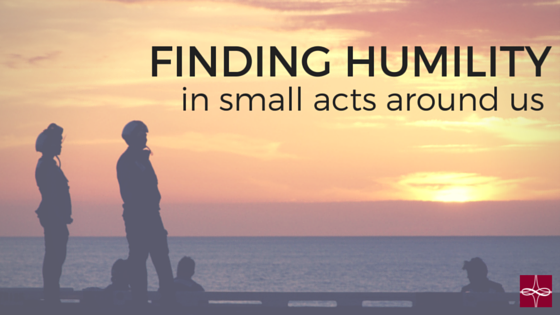
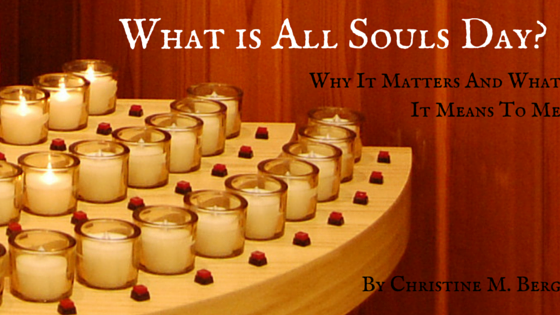

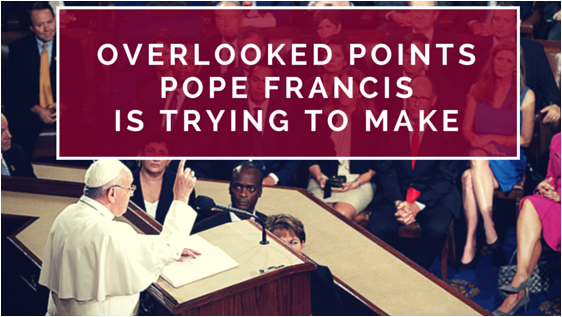

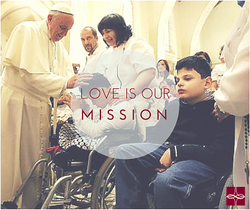


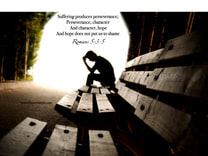
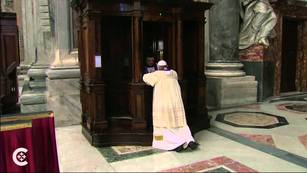



 RSS Feed
RSS Feed